
Everyone’s talking about AI for customer support, and for good reason. Teams are drowning in tickets and customers want answers, like, yesterday. You’ve probably seen LiveChat AI pop up as a solution. It promises to handle up to 70% of customer questions and get you up and running in minutes without writing any code.
But is it the right move for your team? This post is an honest look at what LiveChat AI offers its features, pricing, best-fit scenarios, and some pretty big limitations. The real question you need to answer is whether a standalone chatbot like this is what you need, or if you'd be better off with a tool that works with the helpdesk you already use.
What is LiveChat AI?
At its core, LiveChat AI is a customer support tool that uses large language models (the tech behind things like GPT-4o) to power an AI chatbot. You "train" it by letting it crawl your public content, your website, help center, or documents you upload. The idea is to give customers instant, automated answers 24/7, taking a load off your human agents.
The platform bundles its AI chatbot with a human live chat inbox, marketing itself as an all-in-one package. This can be great for new businesses that don't have a bunch of support tools yet. But here’s the catch: it’s a completely separate system. You can put the chat widget on your site, but it runs with its own dashboard and inbox, totally disconnected from helpdesks like Zendesk or Freshdesk.
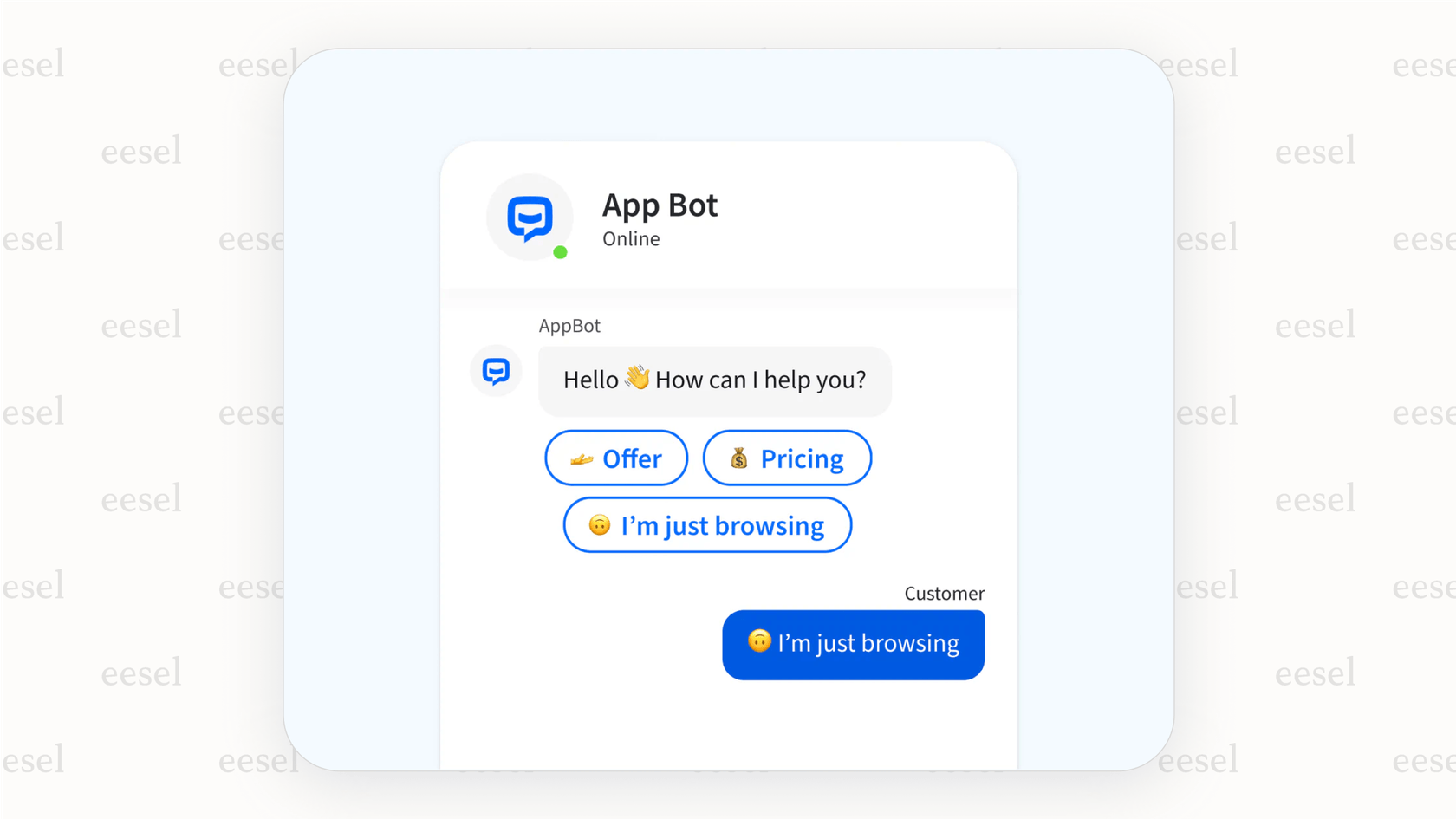
A closer look at its core features
Let's get into what the platform can actually do, looking at both its strengths and where it might leave bigger teams wanting more.
How LiveChat AI learns and the quality of its answers
LiveChat AI can learn from your website pages, text files, PDFs, Q&A lists, Notion pages, and even YouTube videos. It has an AI Boost™ feature that it says cleans up the AI’s grammar and adds context to make responses sound better.
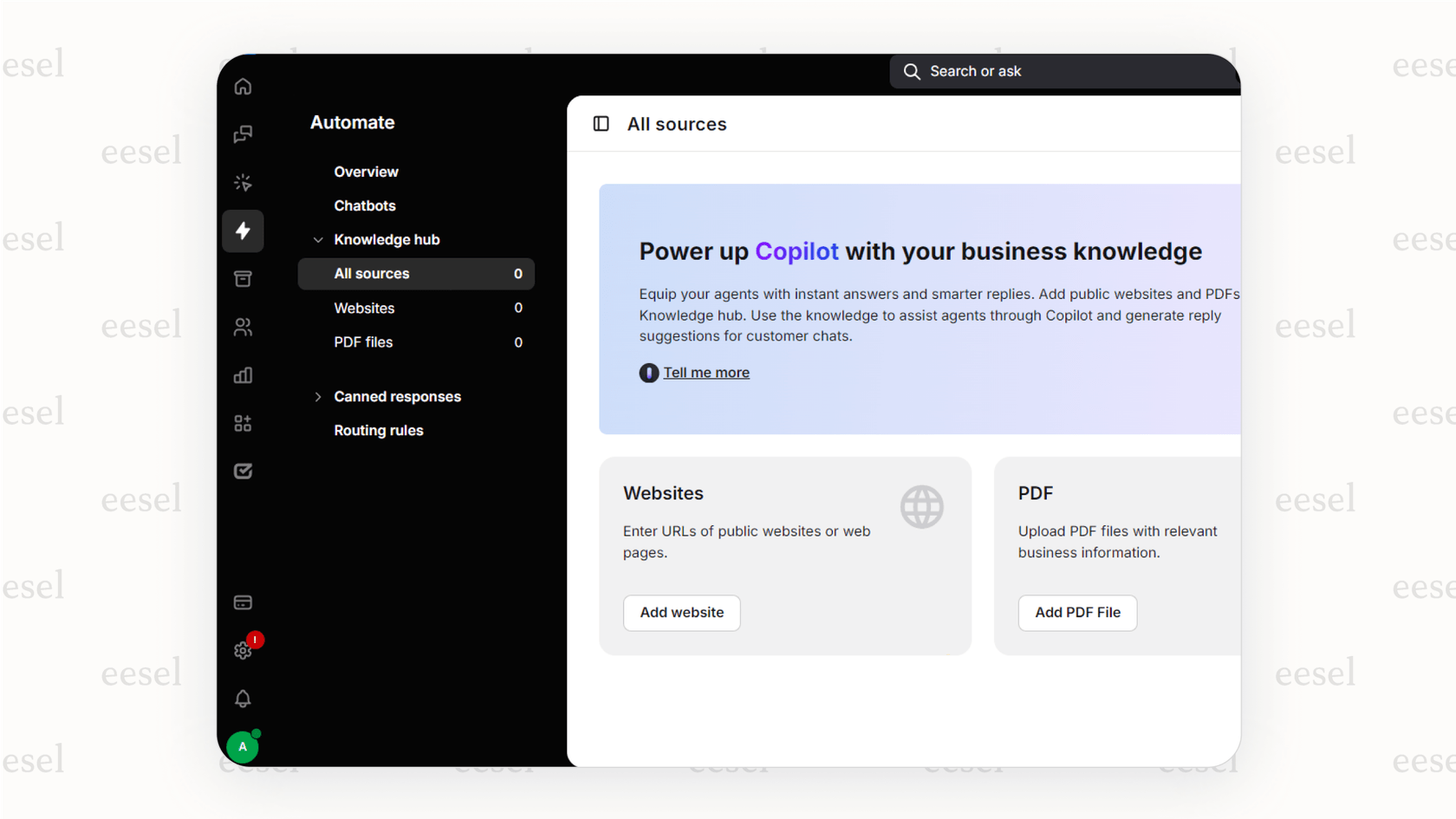
The limitation: This all sounds good, but it relies on your public-facing documents being perfect and complete. The problem is, it misses the single most valuable source of knowledge any support team has: the thousands of past conversations with customers sitting in your helpdesk. Your team’s unique voice, the best answers to tricky questions, and solutions to real-world problems are all buried in your old tickets.
This is where a tool that integrates directly with your helpdesk has a huge advantage. An alternative like eesel AI plugs right into your support system to train on your historical tickets and macros. This lets the AI pick up on nuance, learn from how your star agents solve problems, and give much more accurate answers you'd never find in a simple FAQ article.
LiveChat AI actions and automating workflows
LiveChat AI has a feature called "AI Actions" that lets the chatbot do more than just answer questions. You can set it up to book meetings via Calendly, look up an order status in Shopify, or kick off a workflow in Zapier.
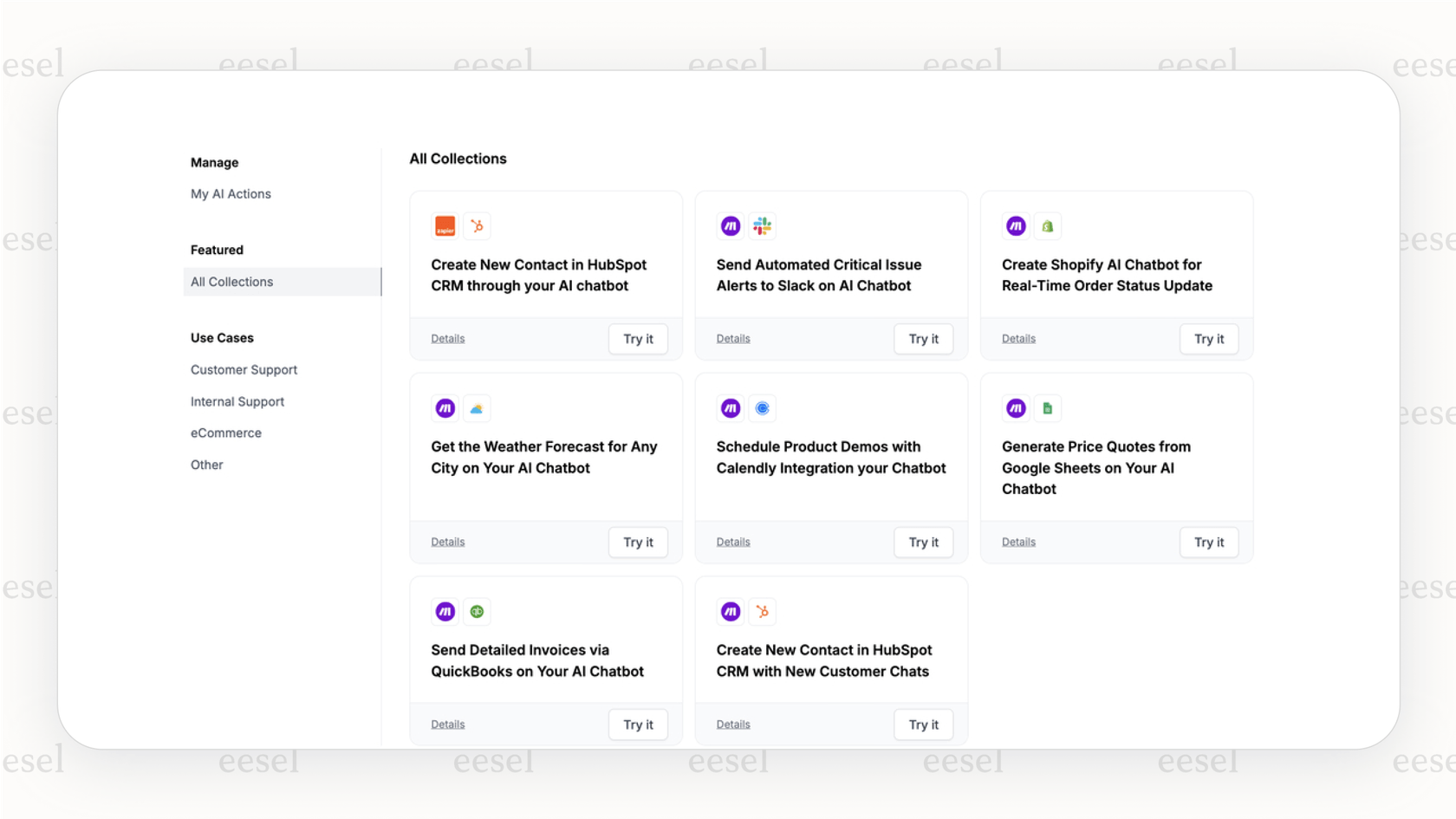
The limitation: These actions are handy for simple customer tasks, but it's a pretty surface-level type of automation. For the most part, they just ping other tools. They don't do much to automate the work happening inside your support team’s main workspace.
A more deeply integrated tool takes a different approach. For example, eesel AI's AI Triage automates tasks within the helpdesk itself. It can tag tickets automatically based on what the customer is asking, send them to the right person, or even close them out without an agent ever having to see them. This saves agents from the boring, manual, and repetitive clicks inside their main tool, which is a much bigger win for efficiency.
LiveChat AI handoff to a human agent
When a customer needs to talk to a person, LiveChat AI transfers the conversation to a human agent in its own built-in live chat inbox. The bot hands off the chat, and an agent has to be logged into the LiveChat AI dashboard to take over.
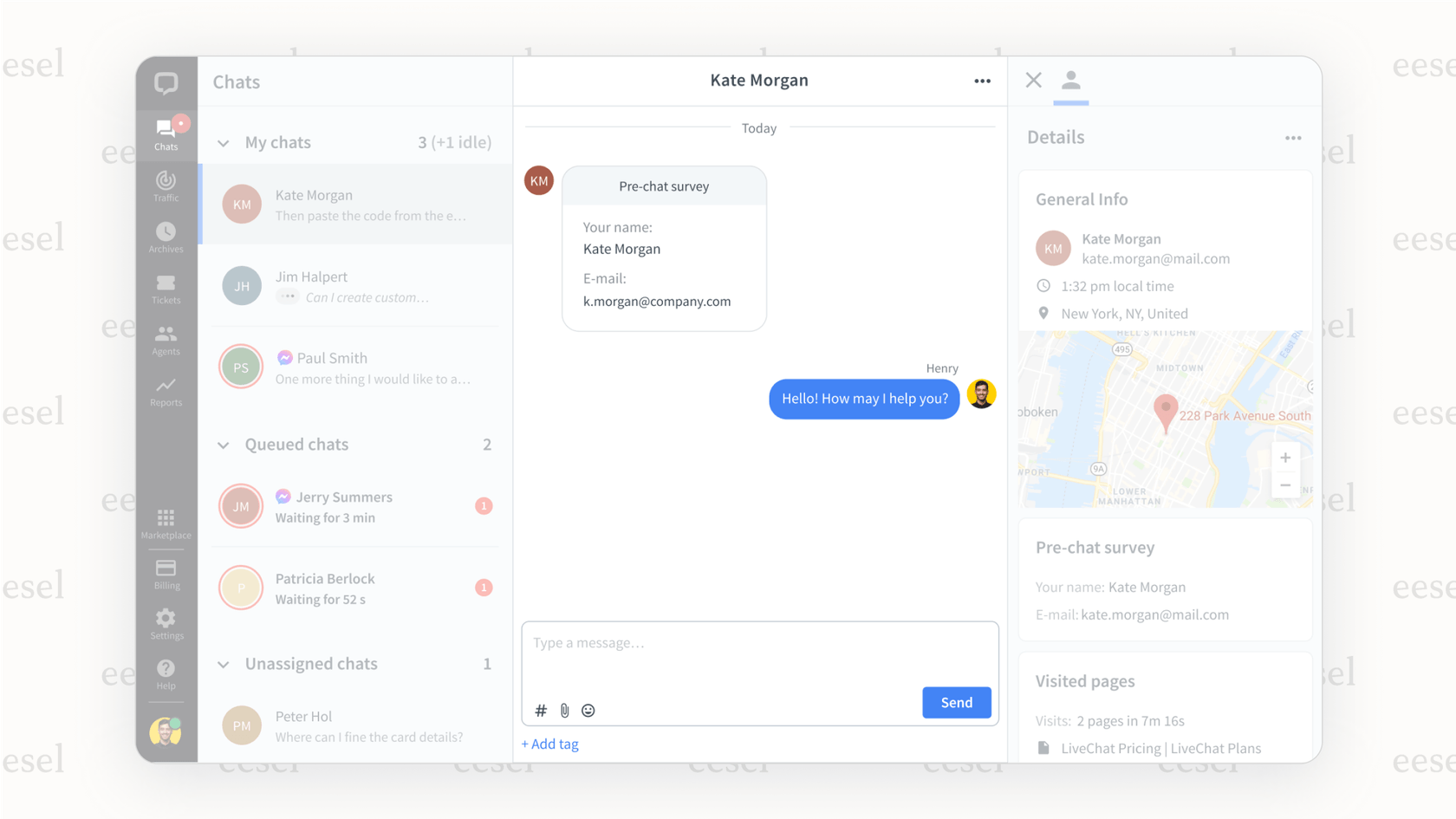
The limitation: For any team that already has a support system, this is a major headache. It means your agents have to learn and constantly check a totally separate tool and inbox. Your conversation history gets split between your main helpdesk (like Jira Service Managemen or Gorgias) and LiveChat AI. It’s another screen to stare at and another process to juggle, which is the opposite of making things easier.
This "rip and replace" approach can really mess up your flow. In contrast, eesel AI works like a layer on top of your current setup. Agents never have to leave the helpdesk they know. The AI Copilot suggests replies and the AI Agent answers tickets right where your team already works, so there's no disruption to their daily routine.
Pricing overview: What to expect
LiveChat AI's pricing is split into a few tiers, along with a free plan that's really just for a quick peek. The plans are based on how many "message credits" you use, how many chatbots you build, and how many agent seats you pay for.
One thing to watch out for is that a lot of the better features are only on the more expensive plans. For example, you can't use "AI Actions" or other integrations on the $39/month Basic plan. And here's a big one: you can only remove the "LiveChatAI" branding from the chat widget on their top-tier "Expert" plan, which is a whopping $389 a month. Also, getting "unlimited" messages on the higher plans isn't as simple as it sounds; you have to connect your own OpenAI API key. That adds a technical hurdle and can lead to surprise bills from OpenAI, making your costs hard to predict.
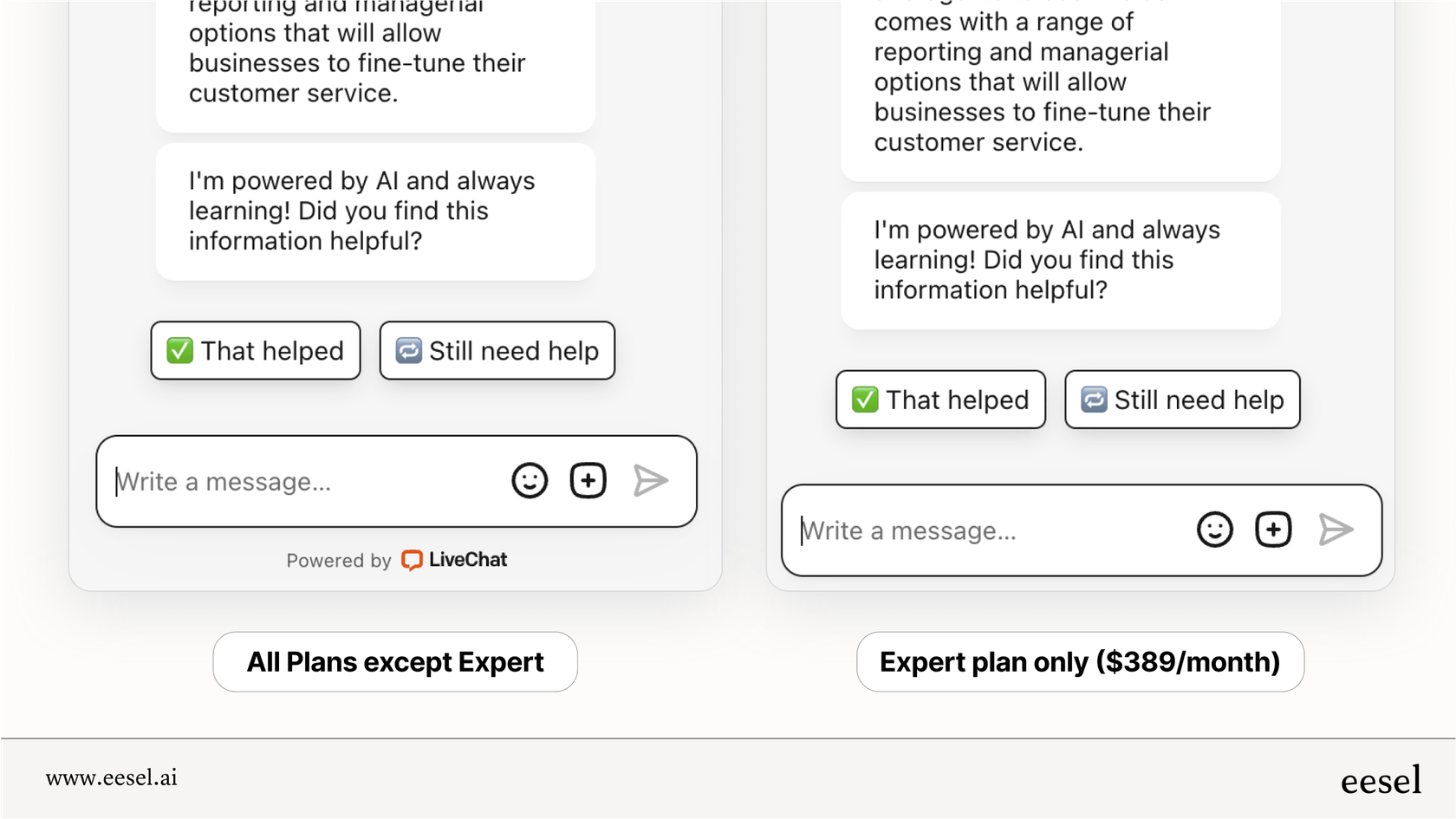
| Plan | Price (Monthly) | Key Features & Limitations |
|---|---|---|
| Free | $0 | 250 messages, 1 chatbot. Displays LiveChatAI branding. Only good for a quick test run. |
| Basic | $39/mo | 4,000 messages, 1 chatbot. No AI Actions or third-party integrations. |
| Pro | $89/mo | 10,000 messages, 2 chatbots. Unlocks AI Actions. |
| Advanced | $189/mo | "Unlimited" messages (needs your own OpenAI API key), 5 chatbots. Unlocks integrations like Slack. |
| Expert | $389/mo | Everything in Advanced, plus you can finally remove their branding from the widget. |
This pricing can feel a bit piecemeal. When you compare, a platform like eesel AI offers pricing that includes all its main products (Agent, Copilot, Triage, Internal Chat) in every plan. The cost scales with your usage, and you get access to powerful features like training on past tickets in the Business tier. It’s a more straightforward investment in your whole support automation setup.
The verdict: Who should (and shouldn't) use LiveChat AI?
Alright, let's cut to the chase. Here's how to know if this tool is right for you.
LiveChat AI is a solid pick if...
- You're a brand new or very small business: If you don't have a helpdesk yet and just need an all-in-one chat tool you can set up fast, LiveChat AI gets the job done.
- Your goal is marketing or simple lead gen: If you just want to answer basic questions on your marketing site and grab leads for the sales team, its simplicity is a big plus.
- All your knowledge is already public: If every bit of your support info is already in a clean, organized, and public help center, crawling the website can be good enough for simple queries.
Key limitations and when you should look elsewhere
- You have an established support team: Forcing your team to use a new, separate inbox is a step backward. It disrupts the workflows you already have in your helpdesk.
- You need highly accurate answers: If your support answers need context from thousands of past customer conversations, LiveChat AI's training method just won't cut it. It can't learn from data it can't see.
- You need internal support (IT or HR): The platform isn't built for internal use cases. You're much better off with a tool designed to work inside Slack or Microsoft Teams.
- You don't like expensive guesswork: LiveChat AI doesn't let you simulate its performance to see what your ROI might be before you commit. You have to build it and hope for the best, which can be a risky experiment.
That last point is a big deal. With eesel AI, you can run a simulation on your past ticket data before you turn anything on. You get to see exactly how many tickets the AI would have solved, what it would have cost, and where you might need to improve your knowledge base. It gives you a clear business case without the guessing games.
The takeaway on LiveChat AI: Good for starters, but has its limits
Look, LiveChat AI is a capable and easy-to-use chatbot. It’s great for new businesses or teams with simple needs who want to quickly get an AI agent on their website. If all you need is to answer FAQs from a public knowledge base, it does the job.
But that simplicity comes with a trade-off. The platform just doesn't have the deep integrations, advanced training options, or internal automation that can really level up a mature support team. Forcing your agents into a separate inbox and not being able to learn from your ticket history puts a hard cap on how much value you can get.
For teams that have already invested time and money into a helpdesk, the smarter move is to make those existing tools even better.
If you want to tap into the knowledge hidden in your support history and automate workflows without making your team switch screens, see how eesel AI can layer right on top of your existing helpdesk. You can get a demo or start your free trial to see what a truly integrated solution can do for your accuracy and ROI.
Frequently asked questions
LiveChat AI functions as a standalone platform with its own inbox and is not designed for deep integration. This means your agents would have to manage conversations in a separate dashboard, which can be disruptive if you already use a helpdesk.
No, the platform primarily learns from public content like your website or documents you upload. It cannot access or train on the historical conversation data within your helpdesk, which can limit its ability to provide highly accurate, context-specific answers.
The tool is built for external, customer-facing use on public websites and is not suited for internal support. For internal helpdesks in Slack or Teams, you would need a solution specifically designed for that environment.
To remove the "LiveChatAI" branding from the chat widget, you must be on their top-tier "Expert" plan, which costs $389 per month. All other paid plans will display their branding.
Share this post

Article by
Kenneth Pangan
Writer and marketer for over ten years, Kenneth Pangan splits his time between history, politics, and art with plenty of interruptions from his dogs demanding attention.






